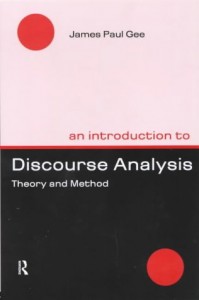Influential linguist and educational theorist James Gee defines his notion of a ‘social language’ and relates an story of it in practice.

Keep in mind that “social languages” and “Discourses” are terms for different things. I will use the term “social languages” to talk about the role of language in Discourses. But as I said above, Discourses always involve more than language. They always involve coordinating language with ways of acting, interacting, valuing, believing, feeling, and with bodies, clothes, non-linguistic symbols, objects, tools, technologies, times, and places. …
Consider, for instance, the following case of an upper-middle-class, Anglo-American young woman named “Jane,” in her twenties, who was attending one of my courses on language and communication. The course was discussing different social languages and, during the discussion, Jane claimed that she herself did not use different social languages in different contexts, but rather, was consistent from context to context. In fact, to do otherwise, she said, would be “hypocritical,” a failure to “be oneself.”
In order to support her claim that she did not switch her style of speaking in different contexts and for different conversational partners, Jane decided to record herself talking to her parents and to her boyfriend. In both cases, she decided to discuss a story the class had discussed earlier, so as to be sure that, in both contexts, she was talking about the same thing.
In the story, a character named Abigail wants to get across a river to see her true love, Gregory. A river boat captain (Roger) says he will take her only if she consents to sleep with him. In desperation to see Gregory, Abigail agrees to do so. But when she arrives and tells Gregory what she has done, he disowns her and sends her away. There is more to the story, but this is enough for our purposes here. Students in my class had been asked to rank order the characters in the story from the most offensive to the least.
In explaining to her parents why she thought Gregory was the worst (least moral) character in the story, the young woman said the following:
Well, when I thought about it, I don’t know, it seemed to me that Gregory should be the most offensive. He showed no understanding for Abigail, when she told him what she was forced to do. He was callous. He was hypocritical, in the sense that he professed to love her, then acted like that.
Earlier, in her discussion with her boyfriend, in an informal setting, she had also explained why she thought Gregory was the worst character. In this context she said:
What an ass that guy was, you know, her boyfriend. I should hope, if I ever did that to see you, you would shoot the guy. He uses her and he says he loves her. Roger never lies, you know what I mean?
It was clear – even to Jane – that she had used two very different forms of language. The differences between Jane’s two social languages are everywhere apparent in the two texts. …
All in all, Jane appears to use more “school-like” language to her parents. Her language to them requires less inferencing on their part and distances them as listeners from social and emotional involvement with what she is saying, while stressing, perhaps, their cognitive involvement and their judgment of her and her “intelligence.” Her language to her boyfriend, on the other hand, stresses social and affective involvement, solidarity, and co-participation in meaning making.
This young woman is making visible and recognizable two different versions of who she is and what she is doing. In one case she is “a dutiful and intelligent daughter having dinner with her proud parents” and in the other case she is “a girlfriend being intimate with her boyfriend.” Of course, I should add, that while people like Jane may talk at dinner this way to their parents, not all people do; there are other identities one can take on for one’s parents, other social languages one can speak to them. And, indeed, there may well be others that Jane would use with her parents in different settings.
Gee, James Paul. 1999. An Introduction to Discourse Analysis: Theory and Method. London: Routledge. pp. 24-29. || Amazon || WorldCat
